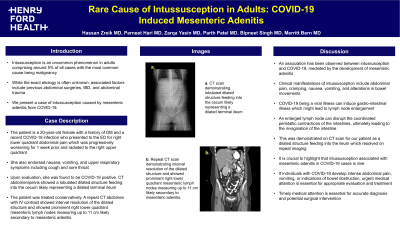Sunday Poster Session
Category: Colon
P0311 - Rare Case of Intussusception in Adults: COVID-19 Induced Mesenteric Adenitis
Sunday, October 22, 2023
3:30 PM - 7:00 PM PT
Location: Exhibit Hall


Hassan Zreik, MD
Henry Ford Health System
Jackson, Michigan
Presenting Author(s)
Hassan Zreik, MD1, Parneet Hari, MD2, Zarqa Yasin, MD3, Parth M. Patel, MD4, Bipneet Singh, MD3, Merritt Bern, MD3
1Henry Ford Health System, Jackson, MI; 2Henry Ford Jackson, Jackson, MI; 3Henry Ford Health, Jackson, MI; 4Henry Ford Health System, Boston, MA
Introduction: Intussusception is an uncommon phenomenon in adults comprising around 5% of all cases with the most common cause being malignancy. While the exact etiology is often unknown, associated factors include previous abdominal surgeries, IBD, and abdominal trauma. We present a case of intussusception caused by mesenteric adenitis from COVID-19.
Case Description/Methods: Patient is a 20-year-old female with a history of DM and recent COVID-19 infection who presented to the ED for right lower quadrant abdominal pain which was progressively worsening for 1 week prior and radiates to the right upper quadrant. She also endorsed nausea, vomiting, and upper respiratory symptoms including cough and sore throat. Upon evaluation, patient was found to be COVID-19 positive. CT abdomen/pelvis showed lobulated dilated structure feeding into the cecum likely representing a dilated terminal ileum. A pelvic ultrasound was non-diagnostic. Patient was treated conservatively. A repeat CT abdomen with IV contrast showed interval resolution of the dilated structure and showed prominent right lower quadrant mesenteric lymph nodes measuring up to 11 cm likely secondary to mesenteric adenitis.
Discussion: Although intussusception in adults is rare, it should be considered in adults presenting with abdominal symptoms. Most commonly they present with abdominal pain, cramping, nausea, vomiting, and alterations in bowel movements and sometimes, with blood in stool. An association has been observed between intussusception and COVID-19, mediated by the development of mesenteric adenitis. COVID-19 being a viral illness can induce gastro-intestinal illness which might lead to lymph node enlargement. An enlarged lymph node can disrupt the coordinated peristaltic contractions of the intestines, ultimately leading to the invagination of the intestine. This was demonstrated on CT scan for our patient as a dilated structure feeding into the ileum which resolved on repeat imaging. It is crucial to highlight that intussusception associated with mesenteric adenitis in COVID-19 cases is rare. However, if individuals with COVID-19 develop intense abdominal pain, vomiting, or indications of bowel obstruction, urgent medical attention is essential for appropriate evaluation and treatment. Timely medical attention is essential for accurate diagnosis and potential surgical intervention. Continued research efforts are focused on unraveling the correlation between COVID-19 and intussusception.

Disclosures:
Hassan Zreik, MD1, Parneet Hari, MD2, Zarqa Yasin, MD3, Parth M. Patel, MD4, Bipneet Singh, MD3, Merritt Bern, MD3. P0311 - Rare Case of Intussusception in Adults: COVID-19 Induced Mesenteric Adenitis, ACG 2023 Annual Scientific Meeting Abstracts. Vancouver, BC, Canada: American College of Gastroenterology.
1Henry Ford Health System, Jackson, MI; 2Henry Ford Jackson, Jackson, MI; 3Henry Ford Health, Jackson, MI; 4Henry Ford Health System, Boston, MA
Introduction: Intussusception is an uncommon phenomenon in adults comprising around 5% of all cases with the most common cause being malignancy. While the exact etiology is often unknown, associated factors include previous abdominal surgeries, IBD, and abdominal trauma. We present a case of intussusception caused by mesenteric adenitis from COVID-19.
Case Description/Methods: Patient is a 20-year-old female with a history of DM and recent COVID-19 infection who presented to the ED for right lower quadrant abdominal pain which was progressively worsening for 1 week prior and radiates to the right upper quadrant. She also endorsed nausea, vomiting, and upper respiratory symptoms including cough and sore throat. Upon evaluation, patient was found to be COVID-19 positive. CT abdomen/pelvis showed lobulated dilated structure feeding into the cecum likely representing a dilated terminal ileum. A pelvic ultrasound was non-diagnostic. Patient was treated conservatively. A repeat CT abdomen with IV contrast showed interval resolution of the dilated structure and showed prominent right lower quadrant mesenteric lymph nodes measuring up to 11 cm likely secondary to mesenteric adenitis.
Discussion: Although intussusception in adults is rare, it should be considered in adults presenting with abdominal symptoms. Most commonly they present with abdominal pain, cramping, nausea, vomiting, and alterations in bowel movements and sometimes, with blood in stool. An association has been observed between intussusception and COVID-19, mediated by the development of mesenteric adenitis. COVID-19 being a viral illness can induce gastro-intestinal illness which might lead to lymph node enlargement. An enlarged lymph node can disrupt the coordinated peristaltic contractions of the intestines, ultimately leading to the invagination of the intestine. This was demonstrated on CT scan for our patient as a dilated structure feeding into the ileum which resolved on repeat imaging. It is crucial to highlight that intussusception associated with mesenteric adenitis in COVID-19 cases is rare. However, if individuals with COVID-19 develop intense abdominal pain, vomiting, or indications of bowel obstruction, urgent medical attention is essential for appropriate evaluation and treatment. Timely medical attention is essential for accurate diagnosis and potential surgical intervention. Continued research efforts are focused on unraveling the correlation between COVID-19 and intussusception.

Figure: Figure 1: a. CT scan demonstrating lobulated dilated structure feeding into the cecum likely representing a dilated terminal ileum b. Repeat CT scan demonstrating interval resolution of the dilated structure and showed prominent right lower quadrant mesenteric lymph nodes measuring up to 11 cm likely secondary to mesenteric adenitis.
Disclosures:
Hassan Zreik indicated no relevant financial relationships.
Parneet Hari indicated no relevant financial relationships.
Zarqa Yasin indicated no relevant financial relationships.
Parth Patel indicated no relevant financial relationships.
Bipneet Singh indicated no relevant financial relationships.
Merritt Bern indicated no relevant financial relationships.
Hassan Zreik, MD1, Parneet Hari, MD2, Zarqa Yasin, MD3, Parth M. Patel, MD4, Bipneet Singh, MD3, Merritt Bern, MD3. P0311 - Rare Case of Intussusception in Adults: COVID-19 Induced Mesenteric Adenitis, ACG 2023 Annual Scientific Meeting Abstracts. Vancouver, BC, Canada: American College of Gastroenterology.
